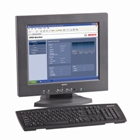Making IP Video Storage Easier To Manage

Bosch Security Systems has released Video Recording Manager (VRM) for centralized management of iSCSI recording from IP cameras and encoders within an IP-based CCTV network. Bosch’s VRM signals the arrival of the second generation of IP network video recording technology, replacing first-generation network video recorders (NVRs).
With the introduction of VRM, Bosch adds system-wide recording management for its direct-to-iSCSI RAID storage, which enables IP cameras and encoders to stream directly to disk. VRM pools all iSCSI RAIDs in a system and, after dividing the total capacity into one Gigabyte storage blocks, allocates storage on demand to IP cameras and encoders. The software acts as a “traffic cop” by helping to distribute video across the various iSCSI disk arrays on the customer’s network.
This design simplifies installation by eliminating the need to estimate the storage requirements for individual or groups of cameras. With load-balancing, cameras with large storage requirements are automatically allocated more disk space, which ensures the desired retention time is achieved across all cameras. Customers also gain added flexibility and improve their return on assets, as they can transparently add storage to the pool as the video surveillance system grows.
VRM’s redundancy and automatic fail-over capabilities deliver unmatched reliability. If an iSCSI disk array fails, VRM immediately redirects camera traffic to a standby array. VRM can also be configured with an optional failover server.
The software also facilitates fast searches, as it provides a database for recordings and metadata. The metadata, which could include events and textual data from sources such as video content analysis or GPS location devices, is recorded with the video footage.
Using direct-to-iSCSI RAIDs with VRM eliminates the need for NVRs and their associated server hardware, operating systems, anti-virus software as well as the ongoing software patches and updates these systems require. Systems using direct-to-iSCSI with VRM are easier to operate and maintain and offer a lower total cost of ownership by reducing the maintenance expenses of PC-based NVRs. The design also improves system performance for high bitrate recording, as each Bosch iSCSI disk array is designed for 200 Mbps of throughput compared to the average NVR’s 70 Mbps limit. Because video does not have to pass through the VRM server to be recorded, it can also support up to 2,000 cameras per server, unlike the average NVR’s 64 camera limit.